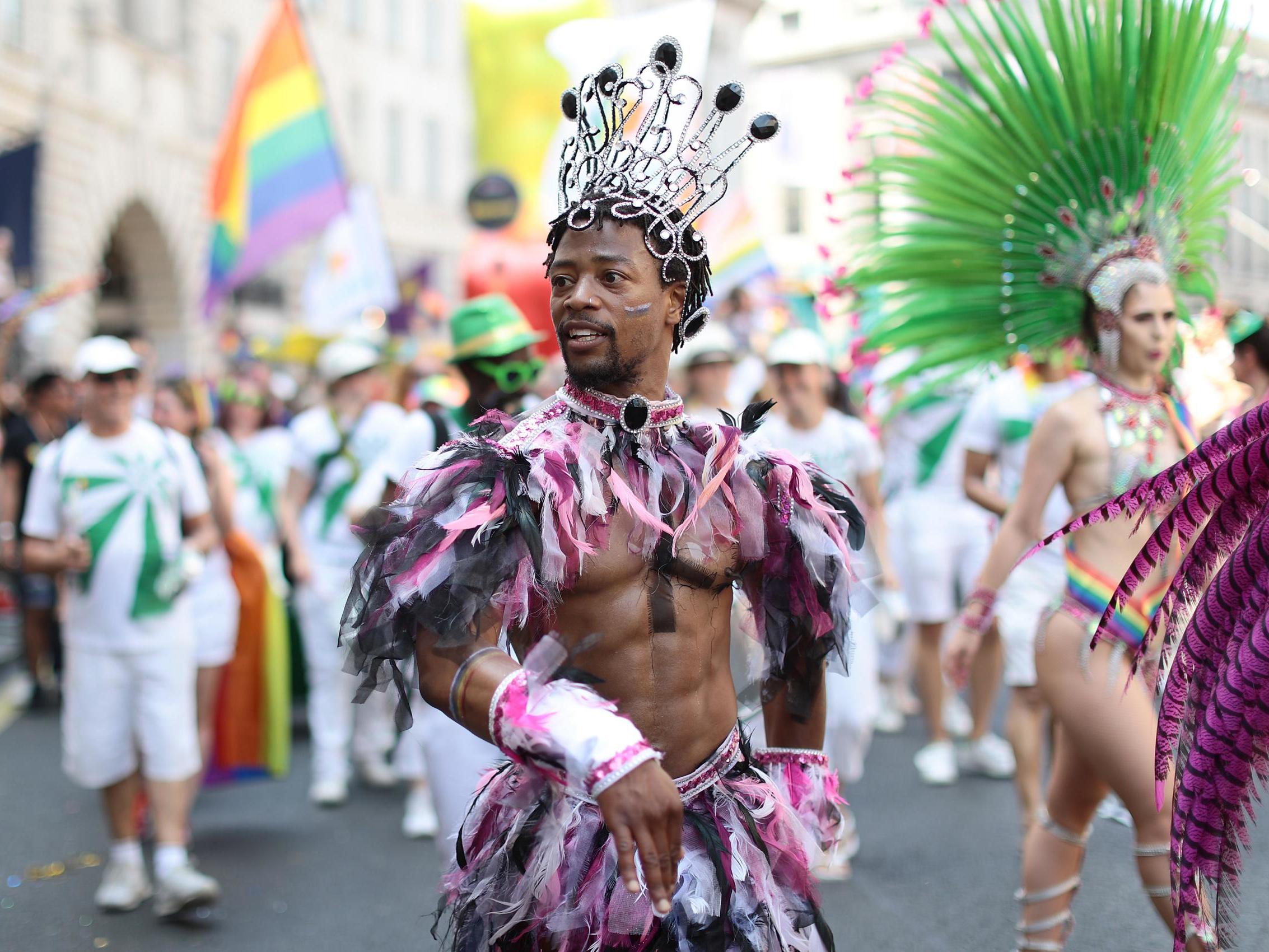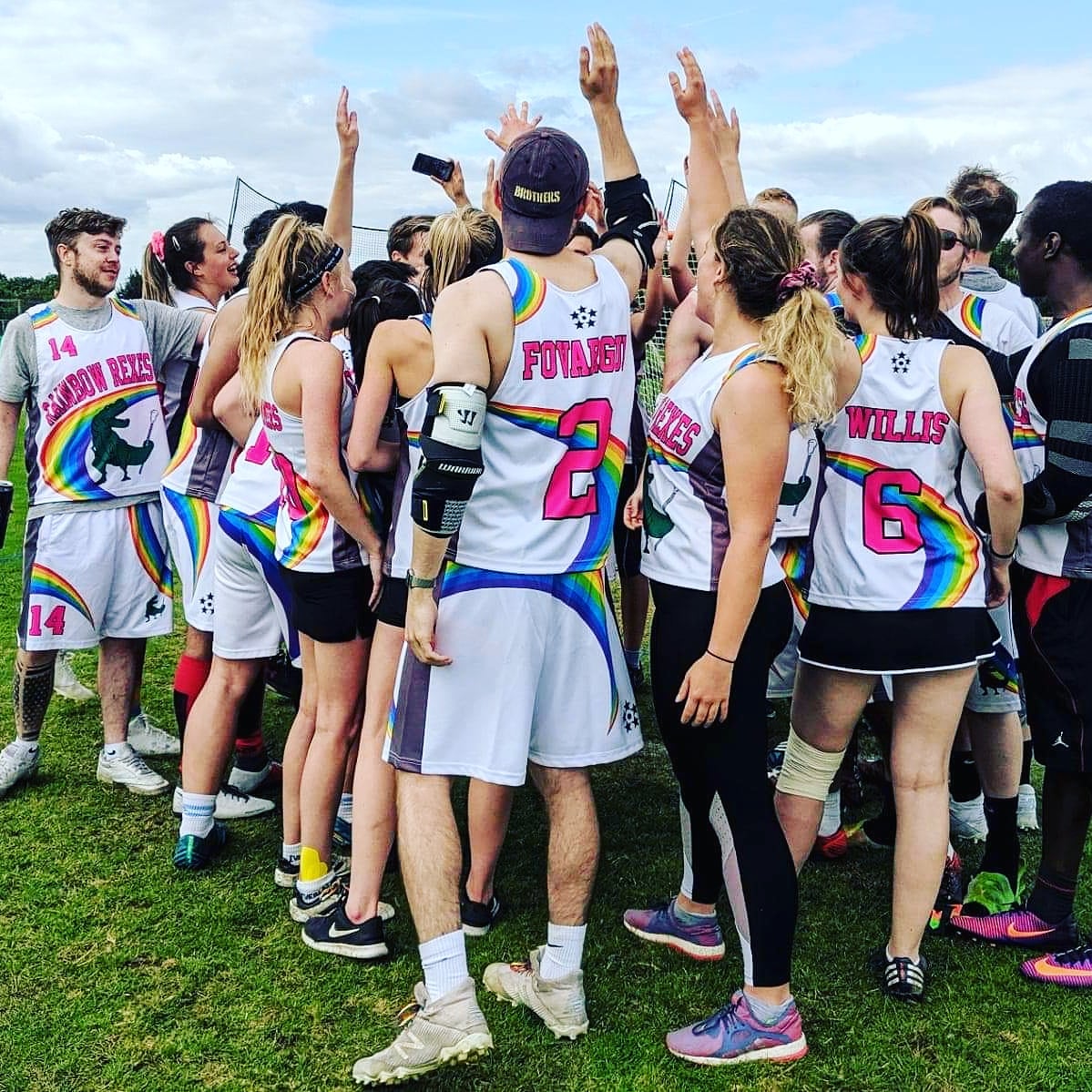How members of the LGBT+ community are celebrating Pride in London without a parade
‘Many queer people are more isolated than usual right now, so sending love and support to the community can make all the difference’

The history of Pride in London stretches all the way back to the early 1970s, when just 2,000 people took part in the first official rally in response to the Stonewall riots of 1969.
Half a century later, the annual parade is both a joyous celebration and fixture that helps to raise awareness of the discrimination members of the LGBT+ community continue to face today.
Last year, on the 50th anniversary of the Stonewall uprising, 600 groups took part in a parade that saw 30,000 marchers proudly walk the streets of the English capital, as an incredible 1.5 million spectators watched on.
In light of the coronavirus pandemic and subsequent lockdown, this year’s Pride has been markedly different. While Pride Month has continued to honour the LGBT+ community, members of the community and allies have been unable to celebrate as they usually would, confined to virtual events or socially distant gatherings.
While many would have been sorely disappointed when it was announced that Pride in London had been postponed from Saturday 27 June until 2021, Dr Julia Shaw, a 33-year-old psychological scientist and author based at UCL, explains to The Independent that Pride “isn’t just about a weekend of celebration”.
“I think Pride is a year-round celebration, so I’m always asking myself how I can better support the queer community,” says Dr Shaw, who this year founded the bisexual research group bisexualresearch.com.
“Pride is even more important during lockdown. Many queer people are more isolated than usual right now, so sending love and support to the community can make all the difference.”
Pride is an integral part of our year, our celebration and our lives
Last week, Dr Shaw celebrated Bi Pride UK online, which made her feel “so happy, connected with the community and heard”, especially considering that for her, it can sometimes feel as though “bisexuality is somewhat invisible”.
“Highlighting the importance of intersectional Pride, including ensuring that Pride is adequately representing the black community, also takes on additional significance for me this year. It’s something we all need to pay attention to more,” she says.
For the lacrosse team the Rainbow Rexes, the postponement of Pride in London and the effect the pandemic had on Pride Month on the whole made them feel “pretty devastated”. Described as the “world’s first LGBTQA inclusive lacrosse team”, the club quickly decided they wanted to celebrate Pride in any way they could.
“Pride is an integral part of our year, our celebration and our lives,” says Ed Connolly, club president. “We are a global movement and family, so London Pride dates aren’t what we focus on, but the entire summer as a Pride season.”

Throughout Pride Month, members of the club have been taking part in interviews and podcasts to ensure that members of the LGBT+ community can learn about them. “We want our message to spread that we are a safe space for individuals to feel supported in these difficult times, even if we can only do that online for the time being,” stated Tilly Powell, women’s captain.
The club has also been providing a network of support for the members of its three teams, including holding Zoom socials. This was particularly important on Mother’s and Father’s Day, Connolly explains, as the days “can be very painful for many of our players who are ostracised or actively face hate from their own parents”.
The club is hoping to organise activities for its team during Pride including an online lip sync and Pride carnival outfit competition, in addition to holding a vote to elect its new committee for the upcoming lacrosse season. “We are voting in our new committee on Pride, as they represent Pride for us,” Connolly says.
People are going to be stuck at home, possibly even with homophobic/transphobic family members and they need a space and respite from that
Oli Davidson, a 26-year-old from London would have usually walked to town on the day of Pride in London to join the Jewish contingent at the parade. As she observes Shabbat, this year she won’t be taking part in any online celebrations on Friday night or during the day on Saturday.
Instead, the avid baker will be making rainbow cupcakes, in addition to organising a Zoom dance party on Saturday evening when Shabbat ends alongside Laviot, a community of LGBT+ Jewish women and non-binary people.
At JW3, otherwise known as Jewish Community Centre London, Pride celebrations would have usually been marked with a Pride Shabbat meal, in addition to LGBT+ events throughout summer. Adapting to lockdown, this year, in collaboration with Jewish LGBT+ organisation KeshetUK, JW3 is helping seven LGBT+ Jews share their stories publicly for the first time.
On Friday 26 June, the day before what would have been the Pride in London parade, a video is also being released in which 15 LGBT+ Jews share what they love about being LGBT+ Jewish, a challenge they have faced in their lives and a hope they have for the future.
Joe Hyman, a 28-year-old young adult programmer at JW3, explains that the video is “all about visibility in a time when Pride won’t be visible on the streets”. “It’s a reminder to LGBT+ Jews that they aren’t alone and to the wider community that we are here and need to be included fully in all areas of Jewish life.”
It’s especially important this year to acknowledge the roots of Pride as a protest and not a party
Hyman adds that for him personally, organising Pride events during lockdown “wasn’t just about Pride”. “It was about the fact that people are going to be stuck at home, possibly even with homophobic/transphobic family members and they need a space and respite from that.”
When Yasmin Benoit, a model and asexuality activist based in Reading, Berkshire, realised that Pride events were going to be cancelled this year, she felt concerned that this would result in “less public interest and less investment” in the LGBT+ community. She immediately adapted to ensure her community had “crucial visibility” during this time, taking part in variety of online queer events throughout the month
“London Pride is like the queer Christmas for me,” Benoit says. “It’s one of my favourite occasions of the year. It’s a very social celebration and as a full-time activist, the increased interest in LGBT+ people means that there are more opportunities to raise awareness for my asexual and aromantic community.”
Benoit adds that it is “especially important this year to acknowledge the roots of Pride as a protest and not a party, with what’s been happening with the murders of black trans women and the Black Lives Matter movement gaining momentum again”.
This is something 23-year-old Dani Ball has taken on board in the lead-up to Pride, having run weekly Zoom quizzes for family and friends
She explains that she has changed her Zoom background to a rainbow flag and has been making an extra effort to include LGBT+ related questions in her quizzes.
“This year I’m spending the Pride period educating myself on the history of Pride and progress made worldwide to forward equal rights,” Ball states.
“In the context of the Black Lives Matter movement, I’ve taken quite an intersectional approach to the reading I’m doing as opposed to the whitewashed view of Pride often pushed out by the media.”
Jamie Love, marketing director and executive producer for Pride Edinburgh, stresses the importance that Pride has in his life. He recalls growing up in the Middle East, where being LGBT+ could result in discrimination and possible criminal penalty
Love describes Pride in London as one of his “favourite” Pride events.
I’m sure many this year are feeling lost without Pride
“Celebrating how far we have come and raising awareness of how far we have to go is paramount for our community,” he says. “Pride allows us to celebrate what makes us different and recognise what unites us, which is love. It also allows us to be seen and heard, which creates conversations that will inspire positive change for our community and beyond.”
Love says it feels “very weird” to be celebrating Pride in lockdown, considering Pride is “all about coming together, which is something that we can’t do at this time”. “Pride is a very important date in the diary for many so I’m sure many, like I am, are feeling a little lost this year without it. However, our community has really gone out of their way to find new channels and opportunities.”
While some will be taking part in online raves, virtual club nights and other digital activities for Pride, others plan on taking a more subdued approach to their celebrations. Danielle, who lives in London, says that as she doesn’t have many queer friends, she’s going to “stay in and try to promote queer voices and experiences, especially those of colour”.
Ros, a prospective medical student, says that she is going to be working in an NHS hospital during Pride weekend, where she will bring in rainbow banners to decorate the ward and treat her coworkers to Pride cookies.
“Luckily I live in a house with other brilliant bisexual women, so we are going to have a little ritual on Sunday to come together and feel grateful, empowered and politicised – accompanied with plenty of Aperol, obviously,” she says.
“We are all in heterosexual relationships at the moment, so I for one am finding it especially important to nourish and celebrate my own queerness when the world might assume otherwise – especially in these isolated and divided times.”
Join our commenting forum
Join thought-provoking conversations, follow other Independent readers and see their replies
Comments
Bookmark popover
Removed from bookmarks